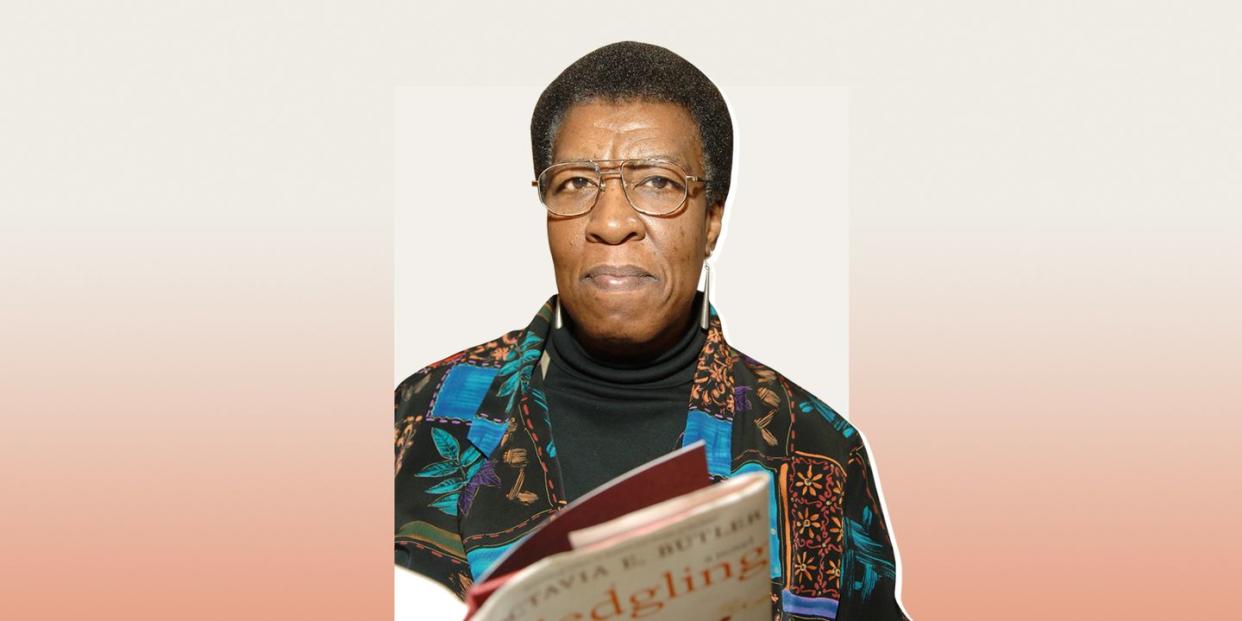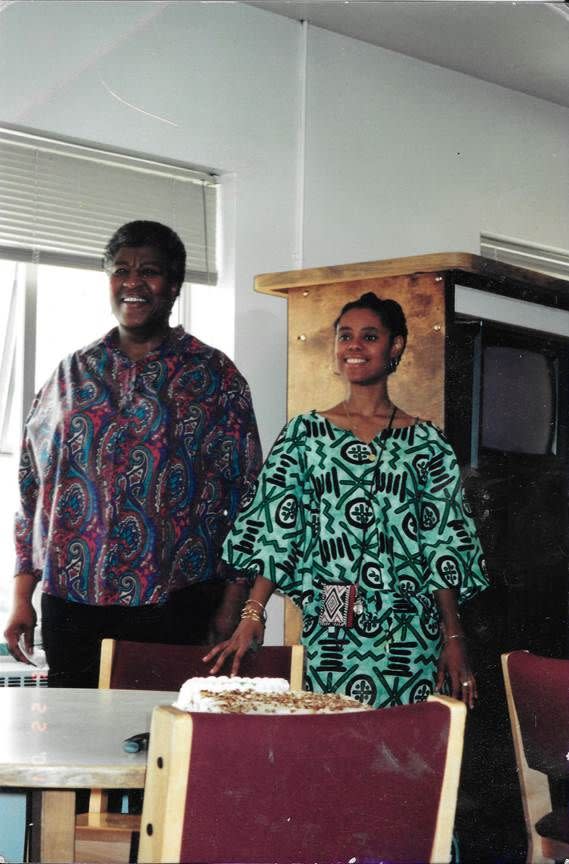Celebrate Octavia Butler's Birthday with an Exclusive Excerpt from a Forthcoming Biography

- Oops!Something went wrong.Please try again later.
- Oops!Something went wrong.Please try again later.
“Hearst Magazines and Verizon Media may earn commission or revenue on some items through the links below.”
Octavia Butler was a visionary science fiction writer who predicted the rise of an American politician who would rise to power with the slogan “Make America Great Again” in her 1998 novel Parable of the Talents. She would have turned 73 today, June 22, had she not died suddenly in 2006 of a stroke. But the Nebula and Hugo Award-winning author who explored themes of gender fluidity, climate change, authoritarianism, and the rise of Big Pharma is perhaps more widely read now than ever, and that phenomenon is destined to grow with the publication Star Child: A Biographical Constellation of Octavia Estelle Butler by Ibi Zoboi, due out in January of 2022.
Zoboi, who was a National Book Award finalist for her young adult novel American Street, is not just a Butler devotee, but was mentored by the writer. Now, she has written an ode to her told in poems and prose. Here, Oprah Daily shares an exclusive sneak peak of the forthcoming volume, just in time to say: Happy Birthday Octavia Butler.
I read my very first Octavia E. Butler novel while in college. I had been taking a creative writing class and my stories were so incredibly strange and otherworldly that a good friend suggested I read Parable of the Sower, Octavia’s tenth novel. I read it in a couple of days, and was so amazed by the story that I eventually bought all her books. I had discovered a whole new world of outer space stories, shape-shifting stories, and mind-controlling stories. I felt less alone and less weird because I had been writing these kinds of strange tales since I was a little girl. I didn’t read science fiction back then because I thought they were big books only meant for grown-ups. But I watched lots and lots of Twilight Zone episodes—an old black-and-white television series about, well, weird stuff.
I immediately began researching everything about Octavia E. Butler. I soon discovered that we shared the very same birthday. We were born exactly thirty years apart. Because of this, I called the telephone operator and gave her name and the city she lived in (this was before social media and search engines on the internet). Much to my delight, her name and number were listed. I called and she picked up. Octavia was kind and generous with her time and she said that she hoped to meet me one day.
Octavia, like myself, started writing when she was very young. She even submitted her stories for publication when she found out she could get paid for doing what she loved best. She was a deep thinker and wondered about the possible worlds that existed beyond our planet. She cared intensely about humanity and how we treated one another. I wondered what kind of child Octavia must’ve been to have had such complex thoughts and ideas.
Through pages and pages of articles and hours of listening to her voice and watching her speak during interviews, I discovered that Octavia was extremely passionate about her writing and her stories. This all began at a young age “to overcome boredom and loneliness,” she once said in an interview. I imagine there are many young writers who are doing the same. What if Octavia had written for children? How would she have made some of these big ideas about our world a bit simpler? “Poetry simplifies it,” she said about her novel Parable of the Sower. She had written poetry for the first time as a way to explain something greater than ourselves. She wanted to convey God in a nursery rhyme, she said. “God is change” is repeated throughout her novels in the Parable series.
Octavia was very much influenced by all that surrounded her—the aftereffects of World War II, the Cold War, space travel, science fiction magazines, the first man on the moon, and even music. This portrait of her life—in poems, essays, quotations, and photographs—serves as a reminder that certain ideas about our world can be understood simply through rhyme, repetition, meter, and metaphor. And like the many complex worlds and themes of Octavia E. Butler’s science fiction novels—an alien planet, a destroyed Earth, time travel, and mind control—poems can serve as different planets and galaxies and gateways with its many structures and rhythms and wordplay.
I decided to call this biography a constellation because Octavia’s mind and her imagination were truly complex wonders—bright and far-reaching. She mapped out her creative life and unwaveringly went after her dream, step by step, day by day.
I did, in fact, have the pleasure of spending some time in person with Octavia E. Butler. After attending one of her book signings in Brooklyn, New York, I hung around a bit, waiting for my chance to get a private moment to thank her for taking my cold call and maybe ask if we could talk about the world and books over tea. I overheard that she was headed back to her hotel in Manhattan and I gladly let her know that I was headed in that direction as well. (This was not entirely true. I lived in Queens, in the opposite direction.) Within minutes, Octavia was in my passenger seat, her friend in the back seat. She told stories about growing up in Pasadena as we drove over the Brooklyn Bridge. I was too starstruck to say much so I never got a chance to tell her that I wanted to be a writer just like her or that we shared a birthday. Later that day, she won the Nebula Award, science fiction’s highest honor, for her novel Parable of the Talents.
In just a little over a year after that first meeting, we were reunited at the Clarion West Science Fiction and Fantasy Writers’ Workshop in Seattle, Washington, where I would work on my stories with sixteen other writers and five other instructors. That first Friday we were there was June 22, and my classmates threw Octavia and me a small birthday party.

I write for children now and this is partly because of my love for Butler’s books and what she contributed to the science-fiction genre. Like Butler, I daydreamed often as a little girl. I had big questions about the world and the universe that were left unanswered by my family, my teachers, and even the books I read. I was intrigued by the old TV series The Twilight Zone. However, it wasn’t until I took my first creative writing classes that I discovered my love of speculative fiction. My first stories were described as “weird” and “not grounded in reality” by instructors in college and writing workshops. Yet, when these stories featured children and teens, they were more accepted by my classmates. In the middle-grade and young adult genres, I can bend reality and have my characters question their worlds in big and small ways. Writing for children has allowed me to tap into my own imagination and allow enough room for young readers to come up with their own answers. Octavia E. Butler had a boundless imagination as a child and even while others doubted her vision, she followed her dreams. With each book she wrote, she tried to answer the big questions about humanity and the universe. She held on to her childlike wonder and made herself a career, a purpose, and a mission out of her imagination.
While Butler’s award-winning novel Kindred is assigned in high schools across the country, and her Parable series is more relevant now than ever before, readers of all ages should know that Octavia Estelle Butler was once a little Black girl growing up during both the civil rights movement and the space race. Only in her many novels, short stories, and essays do these two worlds collide. Her stories merge history, anthropology, sociology, biology, and technology. The biographical speculative poems in Star Child attempt to do the same. The many literary devices in poetry can be used to delve into the twists and turns of history, sink into the many layers of science, and gain greater entry into the depths of a remarkable person’s inner life. These poems aim to capture the small moments in Octavia Estelle Butler’s life and the broad ideas and events that shaped her thinking and her groundbreaking stories in the hope of inspiring a shy, inquisitive, highly imaginative child somewhere out there in the wide, wide universe.
"Star Child"
Estelle
is her middle
name. Estelle means
“star”—a bright shining light at
the very highest point on a pyramid, or a
tree, or a solar system. There to remind us to
look up high above our heads to witness the wonder of
the sky like an ocean-blue blanket, or a glittered canopy, guarding
the secrets of other worlds. And like a star, she was born to listen to the
whispers of the universe, to gather the constellations and weave them into stories.
You Might Also Like

